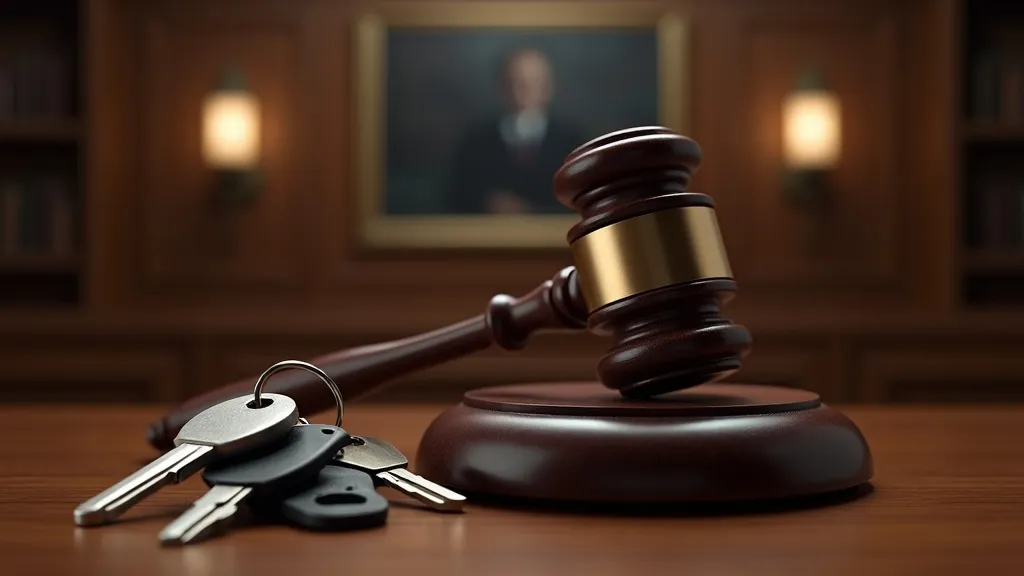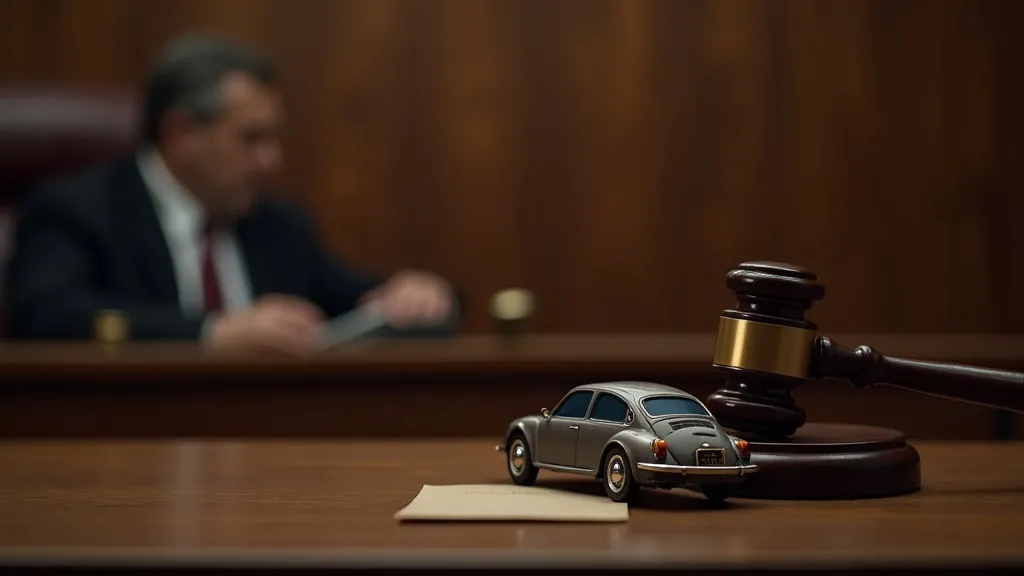Understanding Wrongful Repossession
Wrongful repossession occurs when a vehicle is taken back by a lender without proper legal authority or justification. This article delves into the intricacies of wrongful repossession, exploring its legal ramifications, the rights of the consumer, and the steps one can take if they find themselves a victim of this practice. By understanding these elements, individuals can better protect themselves and seek redress if necessary.

Introduction to Wrongful Repossession
In the complex world of automotive financing, wrongful repossession stands out as a critical issue that affects many consumers. This phenomenon occurs when a lender repossesses a vehicle without proper legal justification, often leading to significant financial and emotional distress for the owner. Understanding the nuances of wrongful repossession is essential for both consumers and industry professionals, as it involves intricate legal and ethical considerations. The impact of wrongful repossession extends beyond the immediate loss of a vehicle; it can also affect credit ratings, future borrowing abilities, and even emotional well-being, underscoring the importance of vigilance and awareness in the automotive finance landscape.
Legal Framework of Repossession
Repossession is a process typically initiated when a borrower defaults on their auto loan payments. In such cases, the lender has the right to reclaim the vehicle, provided they adhere to state laws and the terms outlined in the loan agreement. However, when these legal protocols are ignored or misinterpreted, the action can be deemed wrongful. The legal framework surrounding repossession is shaped by both federal and state laws, with the Uniform Commercial Code (UCC) providing a baseline for repossession practices. Each state may have additional statutes that dictate how repossession must be conducted, including the requirement for notice, the method of repossession, and the timing. Understanding these laws is crucial for consumers to protect their rights effectively.
Identifying Wrongful Repossession
To identify whether a repossession is wrongful, consumers must first understand their rights and the obligations of the lender. Key indicators of wrongful repossession include:
- Repossession without prior notice, when required by law or the loan agreement. Many jurisdictions mandate that lenders provide advance notice of repossession actions, allowing borrowers to address outstanding payments.
- Taking the vehicle from a secured area, such as a closed garage, without explicit consent. Repossession agents are typically prohibited from entering private property or using force to retrieve a vehicle.
- Continuing with repossession despite the borrower taking corrective action, like making a payment arrangement. If a borrower has made arrangements to catch up on missed payments, a lender is usually required to honor that agreement.
- Repossessing a vehicle without a valid default. If a borrower has not defaulted or if the default has been remedied, repossession may be considered wrongful.
Consumer Rights and Protections
Consumers have specific rights that protect them from wrongful repossession. These rights vary by state but generally include the right to be notified of missed payments and the opportunity to rectify the situation before repossession occurs. Additionally, consumers have the right to reclaim personal property from the vehicle post-repossession and to receive a detailed explanation of any fees involved. It’s important for consumers to familiarize themselves with the Fair Debt Collection Practices Act (FDCPA), which provides additional protections against abusive practices by lenders and repossession agents. This act prohibits harassment, false statements, and other unfair practices, ensuring that consumers are treated fairly throughout the repossession process.
Steps to Take if Wrongfully Repossessed
If you believe your vehicle has been wrongfully repossessed, consider the following steps:
- Review your loan agreement and state laws to verify your rights. Understanding the specific terms of your loan and the legal protections available to you is essential in assessing the situation.
- Contact the lender to discuss the situation and seek clarification. Open communication can sometimes resolve misunderstandings and lead to a faster resolution.
- Gather evidence, such as payment records, communication logs, and photographs of the vehicle's condition before repossession. Documenting your case thoroughly will strengthen your position if you need to pursue legal action.
- Consult with a legal professional specializing in consumer rights or automotive law. An attorney can provide guidance tailored to your specific situation and help you understand potential legal recourse.
- File a complaint with the appropriate regulatory agency, which may include the Consumer Financial Protection Bureau (CFPB) or your state’s attorney general. These agencies can investigate complaints and hold lenders accountable for unfair practices.
Legal Recourse and Remedies
Victims of wrongful repossession may pursue legal action against the lender. Potential remedies include:
- Reinstatement of the original loan terms. This may allow the borrower to continue making payments under the original agreement, effectively reversing the repossession.
- Monetary compensation for damages, including emotional distress and lost wages. Some borrowers may experience significant financial and emotional impact due to the repossession, and courts can award compensation for these damages.
- Court orders preventing further repossession attempts. If the court finds in favor of the borrower, it may issue an injunction against the lender, prohibiting them from attempting further repossession.
- Recovery of personal belongings that were in the vehicle at the time of repossession. Depending on the circumstances, consumers may have the right to retrieve their personal property, often requiring negotiation with the lender.
Case Studies and Industry Insights
Case studies provide valuable insights into the real-world implications of wrongful repossession. Analyzing past cases can reveal patterns of lender misconduct and highlight successful legal strategies employed by consumers. For example, the case of Smith v. ABC Finance illustrated how a consumer successfully challenged a repossession due to lack of proper notification. The court ruled in favor of the consumer, leading to a significant monetary award. Industry experts emphasize the importance of transparency and adherence to legal standards to prevent such occurrences. They advocate for improved communication between lenders and borrowers, suggesting that proactive measures, such as financial counseling and flexible repayment options, can significantly reduce the likelihood of default and subsequent repossession.
Preventive Measures for Consumers
To minimize the risk of wrongful repossession, consumers should:
- Maintain clear communication with their lender, especially during financial hardships. Being proactive about potential payment issues can lead to more favorable outcomes, including payment plans or temporary forbearance.
- Keep detailed records of all payments and correspondence. Having a comprehensive record can provide essential evidence in case of disputes and help consumers track their payment history accurately.
- Regularly review the terms of their loan agreement. Understanding the details of the loan can help consumers recognize their rights and obligations, reducing the chances of confusion or miscommunication.
- Consider obtaining insurance that covers repossession-related legal fees. Some financial services offer products that can assist in covering legal expenses in the event of a wrongful repossession.
- Educate themselves on their state laws regarding repossession. Knowing the specific legal protections available in their state can empower consumers to act quickly and decisively if they face repossession.
FAQs
- What constitutes wrongful repossession? Wrongful repossession occurs when a vehicle is taken without following legal procedures or honoring the loan agreement. This can include failure to notify the borrower, taking the vehicle from a private property without consent, or repossessing when the borrower is not in default.
- Can I get my repossessed car back? Yes, if the repossession was wrongful, you might be able to reclaim your vehicle or receive compensation. The likelihood of recovery often hinges on the specific circumstances of the repossession and the legal protections available in your jurisdiction.
- What should I do immediately after my car is repossessed? Contact your lender to understand the reason and seek a legal consultation if you suspect wrongful repossession. Additionally, gather documentation that supports your case for wrongful repossession.
- How long does the repossession process take? The repossession process can vary significantly depending on the lender's policies and the specific circumstances of the loan. Generally, it can occur within a few days after a missed payment, but consumers may have a grace period depending on state laws and lender agreements.
- What if my car was repossessed due to a mistake? If you believe your vehicle was repossessed due to an error, such as improper documentation or miscommunication with the lender, you should gather evidence and consult with a legal professional. You may have a valid claim for wrongful repossession.
- Will a wrongful repossession affect my credit score? Yes, a wrongful repossession can negatively impact your credit score. A repossession typically remains on your credit report for several years, affecting your ability to secure future credit. It is crucial to address any wrongful repossession promptly to mitigate damage to your credit history.
Conclusion
Wrongful repossession is a serious issue that can have far-reaching implications for consumers and lenders alike. By understanding the associated legal frameworks and consumer rights, individuals can better navigate these challenges. For lenders, adhering to ethical and legal standards not only prevents legal repercussions but also builds trust and credibility within the industry. Ongoing education on repossession laws and consumer rights is vital for both parties. As the automotive financing landscape continues to evolve, staying informed and proactive can significantly reduce the risk of wrongful repossession and its associated consequences.
Additional Resources
For consumers seeking further information on wrongful repossession and their rights, numerous resources are available. Organizations such as the Consumer Financial Protection Bureau (CFPB) provide comprehensive guides on auto loans and repossession. Additionally, local legal aid organizations can offer assistance for those facing financial difficulties and potential repossession issues. Online forums and support groups can also serve as platforms for shared experiences and advice from those who have navigated similar situations.
Understanding Repossession Agents
Repossession agents play a crucial role in the repossession process. They are typically hired by lenders to reclaim vehicles that are in default. Understanding the conduct and regulations governing repossession agents is essential for consumers. Agents are required to follow specific legal guidelines during the repossession process, including:
- They cannot use force or threats to repossess a vehicle. This includes physical confrontation or intimidation tactics, which are strictly prohibited.
- They must identify themselves as repossession agents if asked. Transparency is key in maintaining legal and ethical standards during the repossession process.
- They cannot breach the peace. For instance, repossession agents cannot disturb the peace of the community or create a public disturbance during the repossession.
The Impact of Technology on Repossession
Technology has significantly transformed the repossession landscape in recent years. Many lenders now utilize advanced tracking systems and GPS technology to monitor vehicles, making the repossession process more efficient. While this can benefit lenders, it raises ethical questions regarding privacy and consumer rights. For instance, some consumers may not be aware that their vehicle is equipped with tracking devices, leading to potential legal challenges surrounding the legality of tracking and repossession. The use of technology also necessitates stricter regulations to ensure that consumer rights are protected, balancing the interests of lenders and borrowers.
Future Trends in Automotive Financing and Repossession
The future of automotive financing and repossession is likely to be influenced by shifting consumer behaviors, economic trends, and technological advancements. As more consumers turn to online platforms for financing and purchasing vehicles, the repossession process may become increasingly automated. This shift could lead to greater efficiency but also raises concerns regarding the impersonal nature of transactions and the potential for wrongful repossession. Furthermore, as the economy fluctuates, lenders may need to adapt their policies and practices to address changes in default rates and consumer financial stability. Understanding these trends will be essential for consumers, lenders, and legal professionals alike as they navigate the evolving landscape of automotive financing.
The Role of Consumer Advocacy Groups
Consumer advocacy groups play a vital role in raising awareness about wrongful repossession and advocating for stronger consumer protections. These organizations provide education, resources, and support for individuals facing repossession issues. They often engage in lobbying efforts to promote legislative changes that enhance consumer rights and hold lenders accountable for unethical practices. By supporting these advocacy efforts, consumers can contribute to a broader movement aimed at ensuring fairness and transparency in the automotive financing industry.
Conclusion and Call to Action
In conclusion, wrongful repossession is a multifaceted issue that requires careful consideration from both consumers and lenders. By understanding their rights, the legal framework surrounding repossession, and the potential recourse available, consumers can empower themselves to address wrongful repossession effectively. Lenders, on the other hand, must prioritize ethical practices and transparency to foster trust and credibility in their relationships with borrowers. As the automotive financing landscape continues to evolve, ongoing education and advocacy will be essential in shaping a fair and equitable system for all stakeholders involved. Consumers are encouraged to stay informed, seek assistance when necessary, and advocate for their rights in the face of wrongful repossession.
-
1

Explore Thrilling Adventures: Unveil the World's Very Exciting Travel Destinations
-
2

Unlock the Secrets to Maximize Your Kona SUV's Fuel Economy
-
3

Unlock the Highest Resale Profit: Expert Tips for Boosting Your Kona SUV's Value
-
4

Effortless Adaptation to Senior Apartment Living: Master the Transition with This Ultimate Strategy
-
5

Transform Your Senior Apartment into a Cozy and Charming Retreat: Personalized Touches to Make It Truly Home









